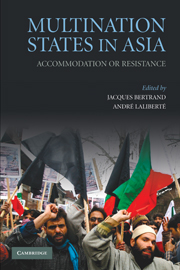Book contents
- Frontmatter
- Contents
- List of Tables and Figures
- List of Maps
- List of Contributors
- Acknowledgments
- Maps
- 1 Introduction
- 2 Revolutionary State Formation and the Unitary Republic of Indonesia
- 3 The Crisis of Border States in India
- 4 Pakistan: Neither State Nor Nation
- 5 Constitutional Politics and Crisis in Sri Lanka
- 6 The Dilemmas of Burma's Multinational Society
- 7 The Double-Edged Sword of Autonomy in Indonesia and the Philippines
- 8 China and the Virtual Taiwan Nation
- 9 The Failure of Ideologies in China's Relations with Tibetans
- 10 Leninism's Long Shadow in Central Asia
- 11 Conclusion
- References
- Index
11 - Conclusion
Published online by Cambridge University Press: 05 June 2012
- Frontmatter
- Contents
- List of Tables and Figures
- List of Maps
- List of Contributors
- Acknowledgments
- Maps
- 1 Introduction
- 2 Revolutionary State Formation and the Unitary Republic of Indonesia
- 3 The Crisis of Border States in India
- 4 Pakistan: Neither State Nor Nation
- 5 Constitutional Politics and Crisis in Sri Lanka
- 6 The Dilemmas of Burma's Multinational Society
- 7 The Double-Edged Sword of Autonomy in Indonesia and the Philippines
- 8 China and the Virtual Taiwan Nation
- 9 The Failure of Ideologies in China's Relations with Tibetans
- 10 Leninism's Long Shadow in Central Asia
- 11 Conclusion
- References
- Index
Summary
The creation of unified polities in Asia remains a daunting challenge because of the numerous claims made by nations within state boundaries. None of the states in the case studies included in this book can claim unmitigated success in achieving harmonious reconciliation between the demands of sub-state nations seeking recognition and the goal of the central government to forge polities that transcend differences between these groups. In fact, there is much variance among states in Asia with respect to the willingness to recognize or accommodate sub-state nationalities. Contributors to this book have traced the roots of this variance, as well as the common traits that characterize many Asian states. Together, they suggest broad patterns and explanatory factors that are rooted in the domestic arena, based on which we suggest tentative generalizations based on the Asian experience.
Although we have found that historical trajectories and domestic political factors provide the strongest explanation of similarities and differences among Asian cases, the international environment has also to some extent conditioned the willingness and ability of Asian states to recognize their multinational status. As many of the contributors have shown, colonialism had a determining influence on the institutional choices made by post-colonial states. The Cold War in Asia, which quickly came to the fore with events such as the Korean War (1950–1953) and the Taiwan Strait Crises (1954–1955, 1958), exacerbated or dampened conflicts within multinational states, as the Bangladesh crisis of 1971 has demonstrated.
- Type
- Chapter
- Information
- Multination States in AsiaAccommodation or Resistance, pp. 263 - 286Publisher: Cambridge University PressPrint publication year: 2010



